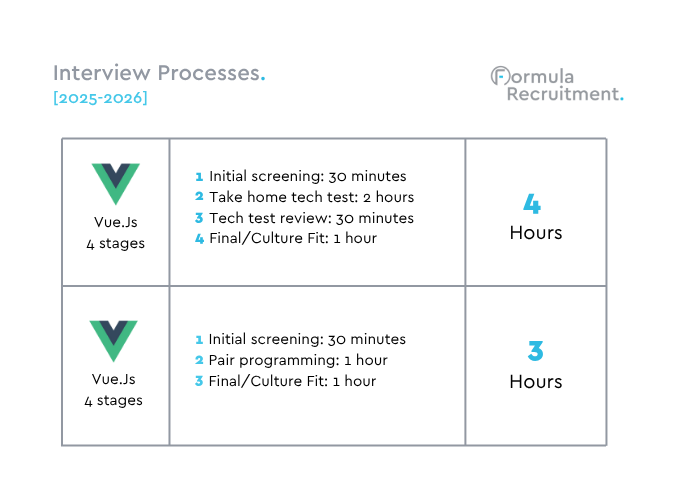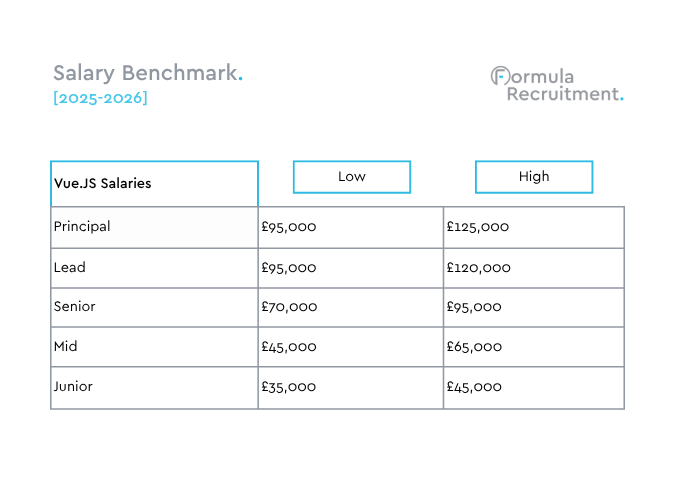- Career advice, Employers
Welcome to the first installment of .js MarketWatch—our new interview series spotlighting developers and engineering leaders across the JavaScript landscape. Each month, we’ll dive into a specific JS framework or trend through the lens of someone working at the heart of it, uncovering what’s shaping the market and where the opportunities lie. We’re kicking things off with Vue.js, featuring insights from David Varela, Global Lead Frontend Engineer at Dr Martens, with previous experience at TJX Europe. From migrating away from jQuery to optimising performance with Vue 3 and the Composition API, David shares practical lessons from the enterprise frontlines. Whether you’re modernising a frontend stack or scaling a Vue-based team, his perspective sets the tone for what’s ahead.
Give us an overview of your experience and your chosen topic within Vue.js…
At TJXEurope, I worked extensively with Vue.js on a large-scale ecommerce platform built on SAP hybris. My focus was on, migrating away from legacy jQuery to Vue.js, performance optimisation and unit testing, particularly using Jest, in a tech stack that included Vuex for state management, TypeScript, and SCSS/SASS.
As part of the frontend team as a Senior Frontend Engineer, I was involved in identifying and resolving performance bottlenecks in Vue components, implementing lazy loaded modules, and optimising reactivity patterns to ensure smooth customer experiences. On the testing side, I helped improve test coverage and reliability across the platform to support faster and safer deployments.
I also contributed to a large-scale localisation project, adapting the website for the German and Austrian markets. This involved handling regional content, feature toggles, and performance considerations for international users. Additionally, I played a key role in the migration away from legacy jQuery code to modern Vue components part of a broader push to modernise and modularise the frontend stack.
Why do you think this topic is especially important right now for the developer community?
Vue.js continues to gain traction as one of the most approachable yet powerful frontend frameworks. With the ecosystem evolving especially with Vue 3 and the Composition API it’s important for developers to understand not just how to build with Vue, but how to structure applications for scalability, maintainability, and performance 3 topics I am always pushing forward.
In enterprise settings like TJXEurope, using Vuex for state management, TypeScript for type safety, and SCSS for styling standardisation made collaboration smoother across the different product teams. As projects grow, adopting these practices helps prevent tightly coupled code which goes hand in hand with monolith architeture and encourages reusable, testable components. With more teams modernising legacy apps, a strong understanding of Vue.js and its ecosystem is essential to leading that transformation.
Is this something clients should be investing in/adopting more readily– and what’s the risk if they ignore it?
In short yes clients modernising their frontend should for sure consider Vue.js as a framework, especially if they’re looking at a balance between rapid development and long-term scalability. Vue learning curve is somewhat smoother than some alternatives, yet it offers deep flexibility through its ecosystem Vuex for centralised state, TypeScript for robust codebases, and SCSS for design consistency.
Ignoring modern frontend practices or clinging to outdated solutions like jQuery can lead to performance bottlenecks, developer churn, and higher long-term costs. By investing in a Vue based stack, clients position themselves for better maintainability, faster iteration, and easier onboarding of new developers, with expanding documentation.
What kind of impact do you think this will have over the next 6–12 months on developers working in Vue.js, or on businesses hiring talent?
Over the next 6–12 months, I expect a growing demand for developers who are comfortable not just writing Vue components, but also structuring full scale applications with Vuex, TypeScript, and modular SCSS. As businesses migrate away from monoliths or legacy frontends, there’s an added premium on engineers who understand how to architect modern, component-based frontends and collaborate effectively in cross-functional teams.
For hiring teams, the Vue ecosystem is mature enough now that it’s no longer just about basic component building they are increasingly looking for developers who can lead migration efforts, enforce type safe coding standards, and contribute to design systems using SCSS and component libraries / component factory.
Are there any tools, libraries, resources, or even people in the community that have really shaped the way you approach this topic?
For sure the Vue documentation alone is one of the best resources out there clean, clear, and community driven apart from that you also have:
- Vue DevTools for debugging and profiling reactive state
- Vuex for predictable, centralised state management
- VueUse an incredibly useful collection of composables that helped streamline logic reuse and promote cleaner, more declarative code in our projects
- Jest and Vue Test Utils for testing
- SASS/SCSS BEM structure and design tokens for scalable theming Community voices like Evan You the creator of Vue.js, Sarah Drasner former core team member, and Anthony Fu creator of tools such as VueUse have helped shape best practices. I’ve also benefited from practical talks at conferences like Vue.js London.
Where would you recommend others go if they want to really dive deep into this area like you have?
To go deep into Vue.js and its ecosystem apart from the previous question, I’d recommend:
- The official Vue.js documentation (for Vue, Vuex, Composition API, etc…)
- Vue Mastery and Vue School for structured courses,
- And for real world use, contribute to open-source Vue projects or explore case studies from ecommerce teams Hands on experience is key building and testing real components in a modular project is where most of the learning happens.
AI – friend or foe? How are you leveraging it in your day-to-day work?
This year, I’m diving into the practical applications of AI in software development for both for productivity and for feature enhancement. I’m particularly interested in and already using some of the below:
- Integrating AI powered tools like Copilot and ChatGPT into the dev workflow to reduce boilerplate and accelerate prototyping.
- Exploring AI-driven user experiences, such as personalised content, intelligent search, or recommendation systems, and how they can be integrated into frontend products.
- Experimenting with natural language interfaces (e.g. customer service chatbots, etc…) that create smoother customer interactions.
- Investigating the implications of AI-generated code and testing on code quality, security, and team collaboration.
- I’m also keeping a close eye on the ethical and privacy considerations around AI in consumer products especially in ecommerce where transparency and user trust are key.
Consultant insights
“We’re seeing an increased usage of Vue.js in commercial tech stacks in 2025 due to a mix of strategic, technical, and community driven factors. There’s a gentle learning curve from the more widely adopted React.js and it works well for both small and large projects. Companies like Vue.js because it saves time, is cheaper to maintain and has great tools and support.”

Why you should be streamining your interview process
“As with most technical roles, a pair-programming session or technical exercise is a common way to screen candidates technically. With competition rife and the adoption of Vue.js seemingly on the up, we’d recommend a streamlined and time efficient process in order to secure the best talent.”

Looking to expand your Dev Team? Or hoping to take the next step in your career? Get in touch with our JavaScript Specialists, Marcus Tansey & Luke Hicks on LinkedIn or give them a call on 020 3940 7464.
Written by Luke Hicks, JavaScript Specialist Technology Consultant









